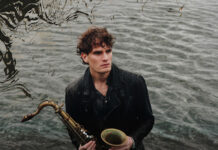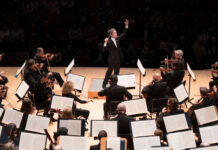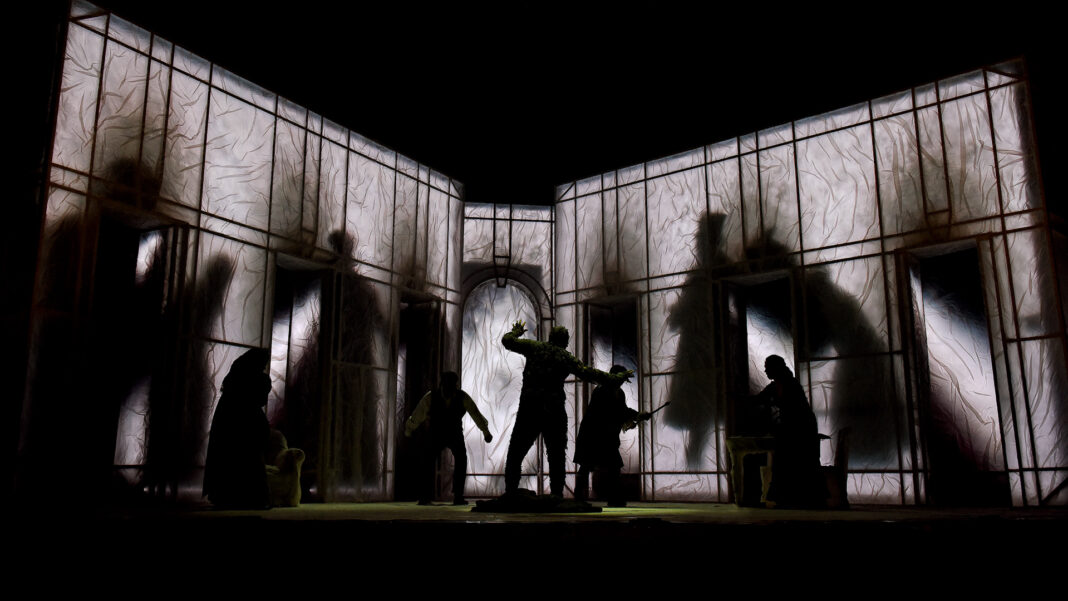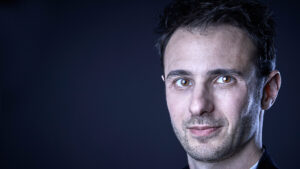
Mary Shelley’s 1818 novel Frankenstein has given birth to classic films, stage plays and musicals. In the case of composer Gregg Kallor, her writing inspired him to write an opera.
His Frankenstein has its world premiere with Arizona Opera giving performances October 13th – 15th in Phoenix at the Herberger Theater Center and October 21st and 22nd at the Temple of Music and Art in Tucson.
The Tell-Tale Heart, his work for piano, cello and voice inspired by Edgar Allan Poe’s story had is world premiere in 2016 and is being performed by the Chamber Music Society of Lincoln Center in New York on October 31st.
Kallor has been working on this opera for six years – longer than any other project he’s created. In 2017 he, along with director Sarah Meyers who first suggested Kallor read Frankenstein, presented sketches of the opera in a Brooklyn Catacomb.
Recently I spoke with Kallor about the process of making his Frankenstein come to life. What follows are excerpts from that conversation that have been edited for length and clarity. To see the full interview, please go to our YouTube channel.
Q: You never read Frankenstein before it was given to you. Subsequently you read it two additional times before you ever started writing any music. During those three readings of Mary Shelley’s Frankenstein what did you personally find in the story that resonated most with you?
I think the thing that maybe spoke to me the most was this sense of otherness. The creature is perceived as other by Victor, his creator, by all of the humans with whom he comes into contact, and he’s persecuted for it. He’s treated horribly by everybody because he looks different. All they know about him is how he looks and the resonance of that.
I don’t think there’s anybody alive or who’s ever lived who can’t in some way identify with that feeling of being perceived as other, whether it’s on the basis of their skin color or their religious beliefs or their gender or political views; whatever the thing is. It’s all about empathy and the lack of empathy and the tragedy of what happens when we don’t treat others with empathy.
Is there something that you found of yourself in what Mary Shelley wrote, or are you finding a way of expressing yourself through what you’re writing as an interpretation of what Mary Shelley wrote?
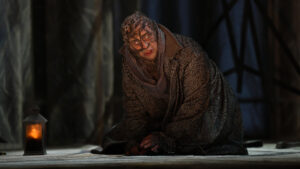
There are aspects of the story with which I identify or which resonate personally. I think there’s also a piece of it that I feel a strong connection to Mary Shelley herself. She, in very subtle, beautiful ways, put herself in the story, but very much behind the curtain.
Her initials in the letters that frame the novel and some of the life circumstances mirror her own. The idea that she’s offering this tale to people to get them to think about this kind of relationship to other people. And how they view others and how they’re treated and loss and grief.
I just love the idea that she’s that she created this incredibly captivating tale. It feels like she’s trying to lead us to a place with more heart. So I think maybe that’s the strongest piece that I find a little bit of myself trying to emulate what she’s done.
We’re supposed to understand that this creature is deserving of the same kind of empathy we ourselves would like to get. What do you believe is the role of empathy and understanding of, or for, the people who don’t understand the monster?
We can’t control our visceral responses, right? That’s beyond our control. What is within our ability to control is what happens next. Rather than instantly reacting with violence, or in some way that’s harsh or callous, is to just take a second and recognize, okay, I’m having this feeling. Am I actually threatened right now or is it just I’m not quite certain what’s happening? Can we can we pause for one second and just try to understand. For me, that’s what empathy is: trying to understand what’s happening there.
Just making it through the day is a challenge for a lot of people. That wears us down and can overwhelm our ability just to put ourselves in someone else’s shoes for a second. I’ve been finding that no matter what I’m going through in my own life, if I assume that everybody I meet is going through at least that much, then that’s a really good starting place.
Is empathy something that can be written into music or do you hope the totality of the libretto and the music leads us there naturally?
I do hope, of course, that the totality of the piece will lead us there. But I have tried very hard to infuse certain interactions with whatever musical feeling of empathy I could find in that circumstance that felt right. I think it is possible to do that. I know it is possible to do that and I hope that I’ve been able to achieve it.
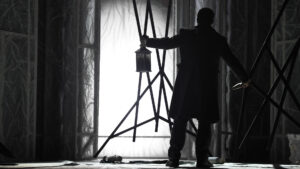
You’re using primarily Mary Shelley’s text for this opera. The way Mary Shelley wrote it – the first edition was published in 1818 – is very different than the way we speak or the way we express ourselves today. Just as you don’t write the same way as Beethoven’s Hammerklavier Sonata which came out the same year as Frankenstein. What was your approach to marrying a 200-year old text with contemporary compositional technique?
I spent a lot of time thinking about this. Her prose is beautiful. But you’re right, it’s not only a little bit foreign to contemporary ears, parts of it would be challenging to set to music. Wherever I was able to keep her precise phrases or sentences I did – if I felt there wouldn’t be a disconnect for our ears now. Happily, I was able to keep a lot of it.
But it took me a while to feel comfortable that I wasn’t actually mutilating her work, but rather translating it. I tweaked here and there to simplify the language, but to very much try to convey the essence of her ideas. Just to translate it into contemporary vernacular. But there are many direct quotes both from the novel and from her journals. That was actually one of the most fascinating parts of the process, how do I keep Mary Shelley’s voice in this translation of her work.
What does bringing your perspective allow you to say that complements what Mary Shelley had to say? We do live in a very different world for obvious reasons than she lived in 205 years ago.
And yet in some ways very little has changed. What I hope to bring to it is really just a different experience of her work of genius. As you said, the novel’s over 200 years old and the prose is quite stylized and can be dense. I love it. I think once you find its rhythm, it’s gorgeous and it’s so rich. So my hope is that through music, through the staging, it just speaks to people in a way that they might not have experienced in any other way. And that it moves them in some way.
We’ve talked about what Mary Shelley wanted to tell and express in the story, how resonant it is today and how there are universal themes. What would you like your role to be vis-a-vis Frankenstein in expanding that narrative and expanding that narrative in an art form that previously hasn’t seen or heard this story?
I’d like to be a champion of Mary Shelley’s story. So that people who haven’t yet experienced it can. Because I believe so firmly that it will speak to them. I hope my translation of it in this musical form speaks to them. I think there may be no greater compliment than having this opera, this music, get people excited about reading Mary Shelley’s novel. I want to be a point of connection between people and the novel. Hopefully that point of connection will include the music that I’ve written and that the cast and this company are bringing to life very well.
What have you gotten out of the creation of your own Frankenstein?

Incredible stimulation. I have learned so much as a composer, as a collaborator [and] as a human. This is the largest, the most ambitious project I’ve ever worked on. We’ll find out in a couple of weeks if it’s successful on an artistic level. But on a personal level, the process has been incredible.
Honestly, it’s been very difficult at times. The highs have been unbelievable. The evolution of going from working alone to collaborating with individuals to collaborating with groups; each phase of it I learn more. Not just about the music and the libretto, but also my approach to each phase of it and my approach to collaboration.
This project has seen me through six years of life now and a lot of life has happened in that time. So at times it’s been a lifeline to me to have this to work on. At other times it’s been a burden when there have been deadlines and my attention is in different places. But in all ways it’s now a central component of who I am. Which is an odd thing to have one’s soul or identity so wrapped up with something that I can’t even touch. But it’s given me a rich experience and a lot of personal growth.
To see the full interview with Gregg Kallor, please go here.
Main Photo: Arizona Opera’s production of Frankenstein by Gregg Kallor (Photo by Tim Trimble Photography/Courtesy Arizona Opera)






